Responsible Enterprise: Government Role and Ethical Considerations
VerifiedAdded on 2020/05/28
|14
|3429
|99
Report
AI Summary
This report delves into the multifaceted concept of responsible enterprise, exploring its various interpretations and contrasting it with related concepts such as corporate social responsibility (CSR), sustainable business, social enterprise, and corporate responsibility. It examines the nature of ethical business, evaluating its direct and indirect impacts on business behavior, including its ability to create customer value and higher profit margins. Furthermore, the report investigates the role of government as an influencer or barrier to responsible business approaches, considering its influence on ethical business practices. The analysis covers key aspects like leadership, integrity, values, loyalty, respect, and concern, highlighting their importance in ethical business operations. It also discusses how ethical business fosters competitive advantages, strengthens stakeholder relationships, and contributes to long-term profitability. The report emphasizes the significance of ethical business in the market due to its credibility, employee relations, and decision-making processes. Finally, it examines how government actions, through regulation, facilitation, and partnership, shape the landscape of responsible business practices.
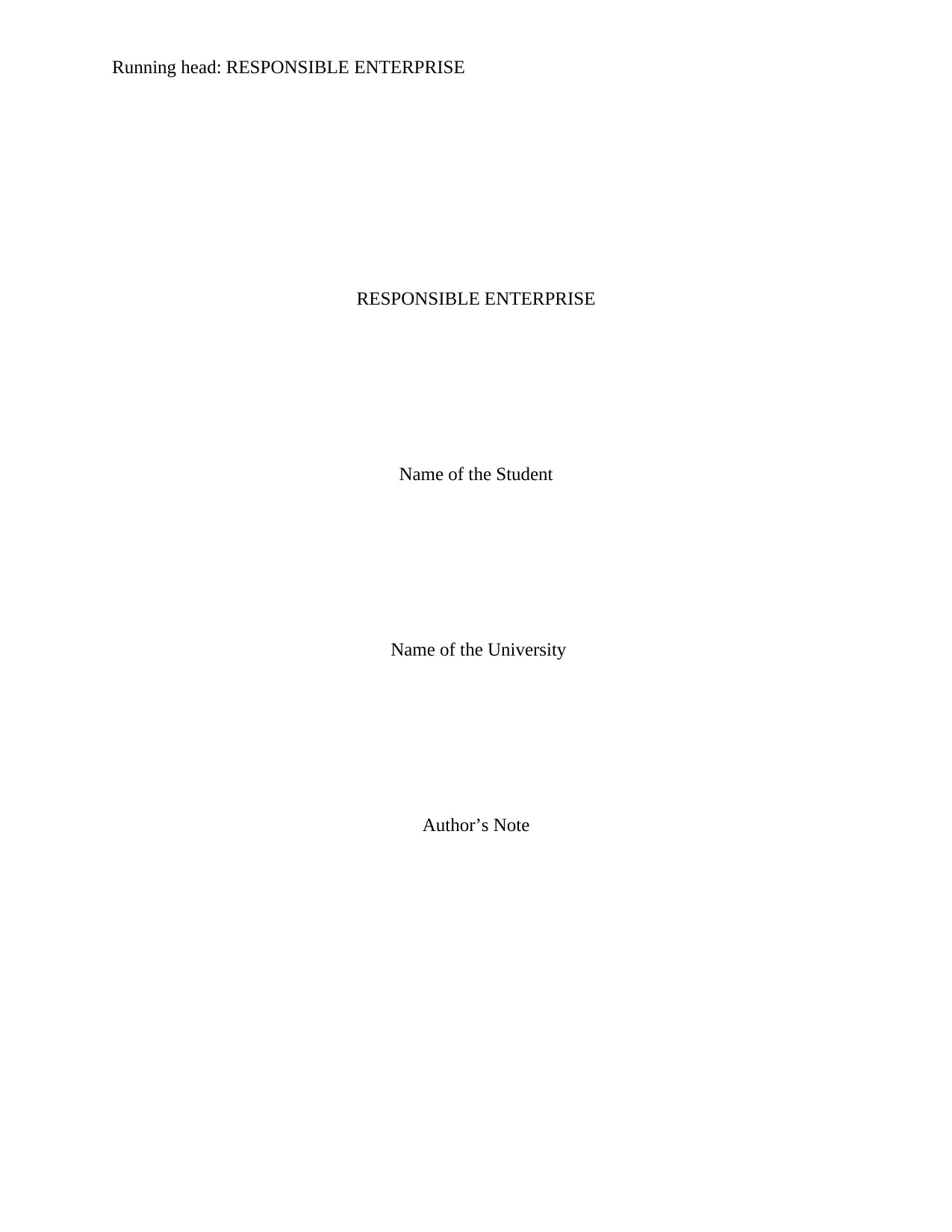
Running head: RESPONSIBLE ENTERPRISE
RESPONSIBLE ENTERPRISE
Name of the Student
Name of the University
Author’s Note
RESPONSIBLE ENTERPRISE
Name of the Student
Name of the University
Author’s Note
Paraphrase This Document
Need a fresh take? Get an instant paraphrase of this document with our AI Paraphraser
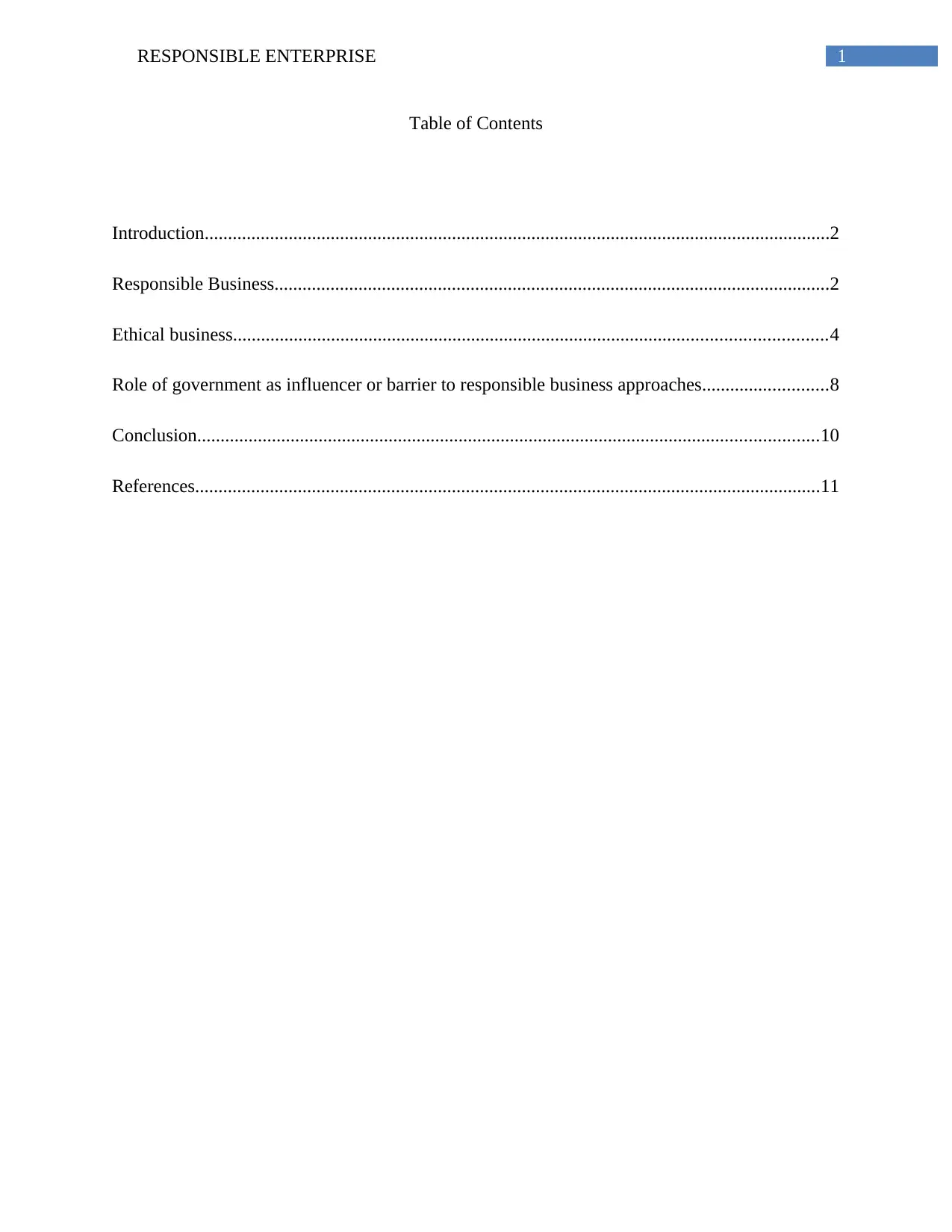
1RESPONSIBLE ENTERPRISE
Table of Contents
Introduction......................................................................................................................................2
Responsible Business.......................................................................................................................2
Ethical business...............................................................................................................................4
Role of government as influencer or barrier to responsible business approaches...........................8
Conclusion.....................................................................................................................................10
References......................................................................................................................................11
Table of Contents
Introduction......................................................................................................................................2
Responsible Business.......................................................................................................................2
Ethical business...............................................................................................................................4
Role of government as influencer or barrier to responsible business approaches...........................8
Conclusion.....................................................................................................................................10
References......................................................................................................................................11
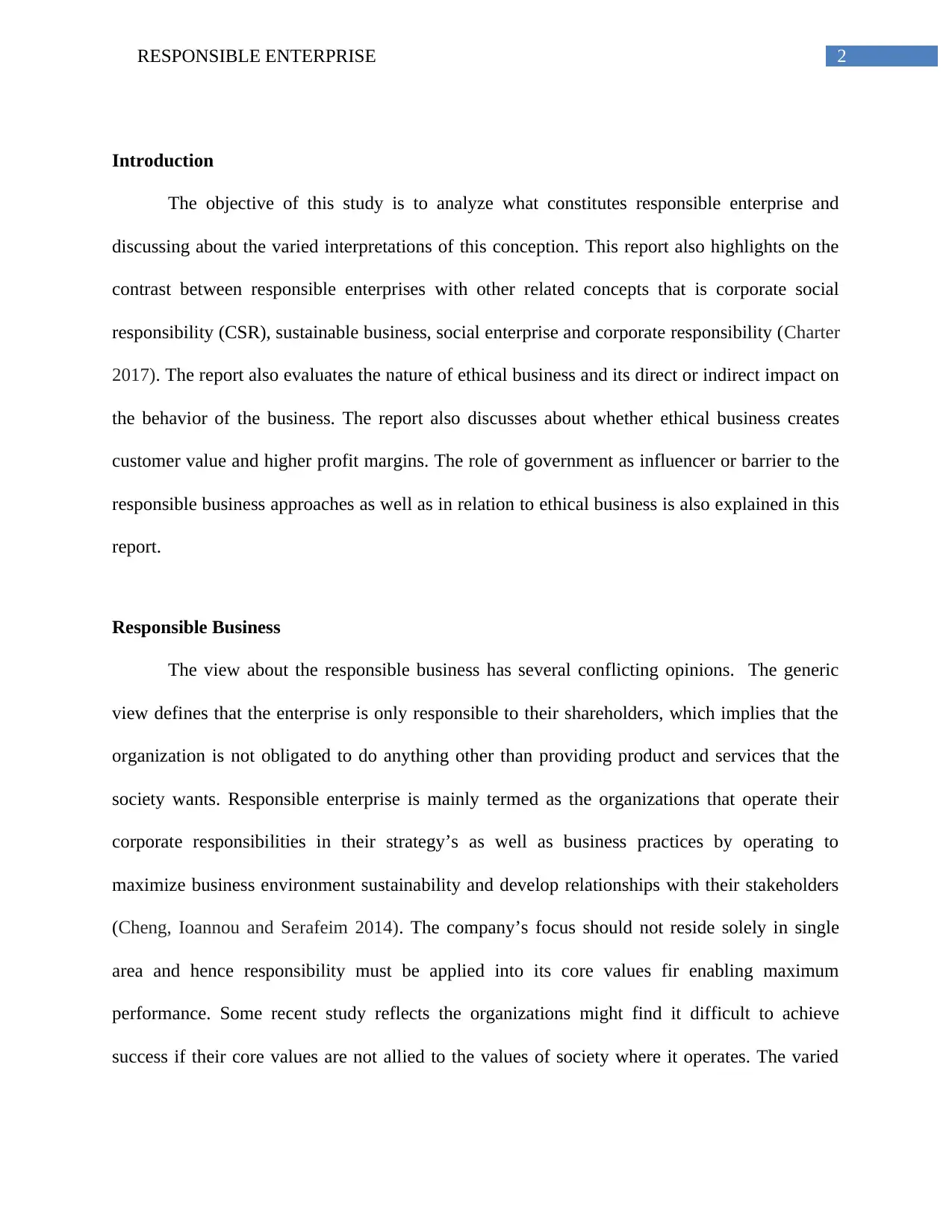
2RESPONSIBLE ENTERPRISE
Introduction
The objective of this study is to analyze what constitutes responsible enterprise and
discussing about the varied interpretations of this conception. This report also highlights on the
contrast between responsible enterprises with other related concepts that is corporate social
responsibility (CSR), sustainable business, social enterprise and corporate responsibility (Charter
2017). The report also evaluates the nature of ethical business and its direct or indirect impact on
the behavior of the business. The report also discusses about whether ethical business creates
customer value and higher profit margins. The role of government as influencer or barrier to the
responsible business approaches as well as in relation to ethical business is also explained in this
report.
Responsible Business
The view about the responsible business has several conflicting opinions. The generic
view defines that the enterprise is only responsible to their shareholders, which implies that the
organization is not obligated to do anything other than providing product and services that the
society wants. Responsible enterprise is mainly termed as the organizations that operate their
corporate responsibilities in their strategy’s as well as business practices by operating to
maximize business environment sustainability and develop relationships with their stakeholders
(Cheng, Ioannou and Serafeim 2014). The company’s focus should not reside solely in single
area and hence responsibility must be applied into its core values fir enabling maximum
performance. Some recent study reflects the organizations might find it difficult to achieve
success if their core values are not allied to the values of society where it operates. The varied
Introduction
The objective of this study is to analyze what constitutes responsible enterprise and
discussing about the varied interpretations of this conception. This report also highlights on the
contrast between responsible enterprises with other related concepts that is corporate social
responsibility (CSR), sustainable business, social enterprise and corporate responsibility (Charter
2017). The report also evaluates the nature of ethical business and its direct or indirect impact on
the behavior of the business. The report also discusses about whether ethical business creates
customer value and higher profit margins. The role of government as influencer or barrier to the
responsible business approaches as well as in relation to ethical business is also explained in this
report.
Responsible Business
The view about the responsible business has several conflicting opinions. The generic
view defines that the enterprise is only responsible to their shareholders, which implies that the
organization is not obligated to do anything other than providing product and services that the
society wants. Responsible enterprise is mainly termed as the organizations that operate their
corporate responsibilities in their strategy’s as well as business practices by operating to
maximize business environment sustainability and develop relationships with their stakeholders
(Cheng, Ioannou and Serafeim 2014). The company’s focus should not reside solely in single
area and hence responsibility must be applied into its core values fir enabling maximum
performance. Some recent study reflects the organizations might find it difficult to achieve
success if their core values are not allied to the values of society where it operates. The varied
⊘ This is a preview!⊘
Do you want full access?
Subscribe today to unlock all pages.

Trusted by 1+ million students worldwide
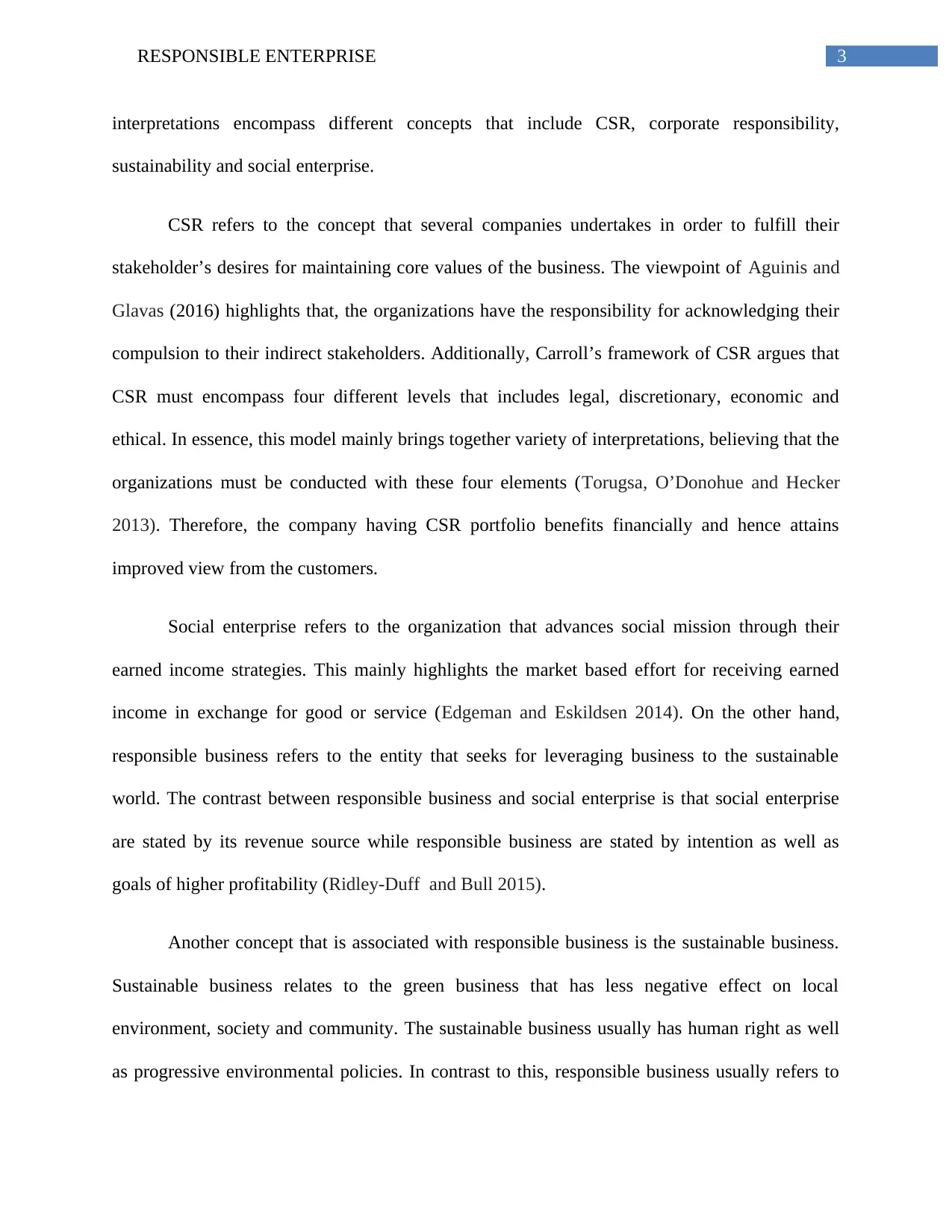
3RESPONSIBLE ENTERPRISE
interpretations encompass different concepts that include CSR, corporate responsibility,
sustainability and social enterprise.
CSR refers to the concept that several companies undertakes in order to fulfill their
stakeholder’s desires for maintaining core values of the business. The viewpoint of Aguinis and
Glavas (2016) highlights that, the organizations have the responsibility for acknowledging their
compulsion to their indirect stakeholders. Additionally, Carroll’s framework of CSR argues that
CSR must encompass four different levels that includes legal, discretionary, economic and
ethical. In essence, this model mainly brings together variety of interpretations, believing that the
organizations must be conducted with these four elements (Torugsa, O’Donohue and Hecker
2013). Therefore, the company having CSR portfolio benefits financially and hence attains
improved view from the customers.
Social enterprise refers to the organization that advances social mission through their
earned income strategies. This mainly highlights the market based effort for receiving earned
income in exchange for good or service (Edgeman and Eskildsen 2014). On the other hand,
responsible business refers to the entity that seeks for leveraging business to the sustainable
world. The contrast between responsible business and social enterprise is that social enterprise
are stated by its revenue source while responsible business are stated by intention as well as
goals of higher profitability (Ridley-Duff and Bull 2015).
Another concept that is associated with responsible business is the sustainable business.
Sustainable business relates to the green business that has less negative effect on local
environment, society and community. The sustainable business usually has human right as well
as progressive environmental policies. In contrast to this, responsible business usually refers to
interpretations encompass different concepts that include CSR, corporate responsibility,
sustainability and social enterprise.
CSR refers to the concept that several companies undertakes in order to fulfill their
stakeholder’s desires for maintaining core values of the business. The viewpoint of Aguinis and
Glavas (2016) highlights that, the organizations have the responsibility for acknowledging their
compulsion to their indirect stakeholders. Additionally, Carroll’s framework of CSR argues that
CSR must encompass four different levels that includes legal, discretionary, economic and
ethical. In essence, this model mainly brings together variety of interpretations, believing that the
organizations must be conducted with these four elements (Torugsa, O’Donohue and Hecker
2013). Therefore, the company having CSR portfolio benefits financially and hence attains
improved view from the customers.
Social enterprise refers to the organization that advances social mission through their
earned income strategies. This mainly highlights the market based effort for receiving earned
income in exchange for good or service (Edgeman and Eskildsen 2014). On the other hand,
responsible business refers to the entity that seeks for leveraging business to the sustainable
world. The contrast between responsible business and social enterprise is that social enterprise
are stated by its revenue source while responsible business are stated by intention as well as
goals of higher profitability (Ridley-Duff and Bull 2015).
Another concept that is associated with responsible business is the sustainable business.
Sustainable business relates to the green business that has less negative effect on local
environment, society and community. The sustainable business usually has human right as well
as progressive environmental policies. In contrast to this, responsible business usually refers to
Paraphrase This Document
Need a fresh take? Get an instant paraphrase of this document with our AI Paraphraser
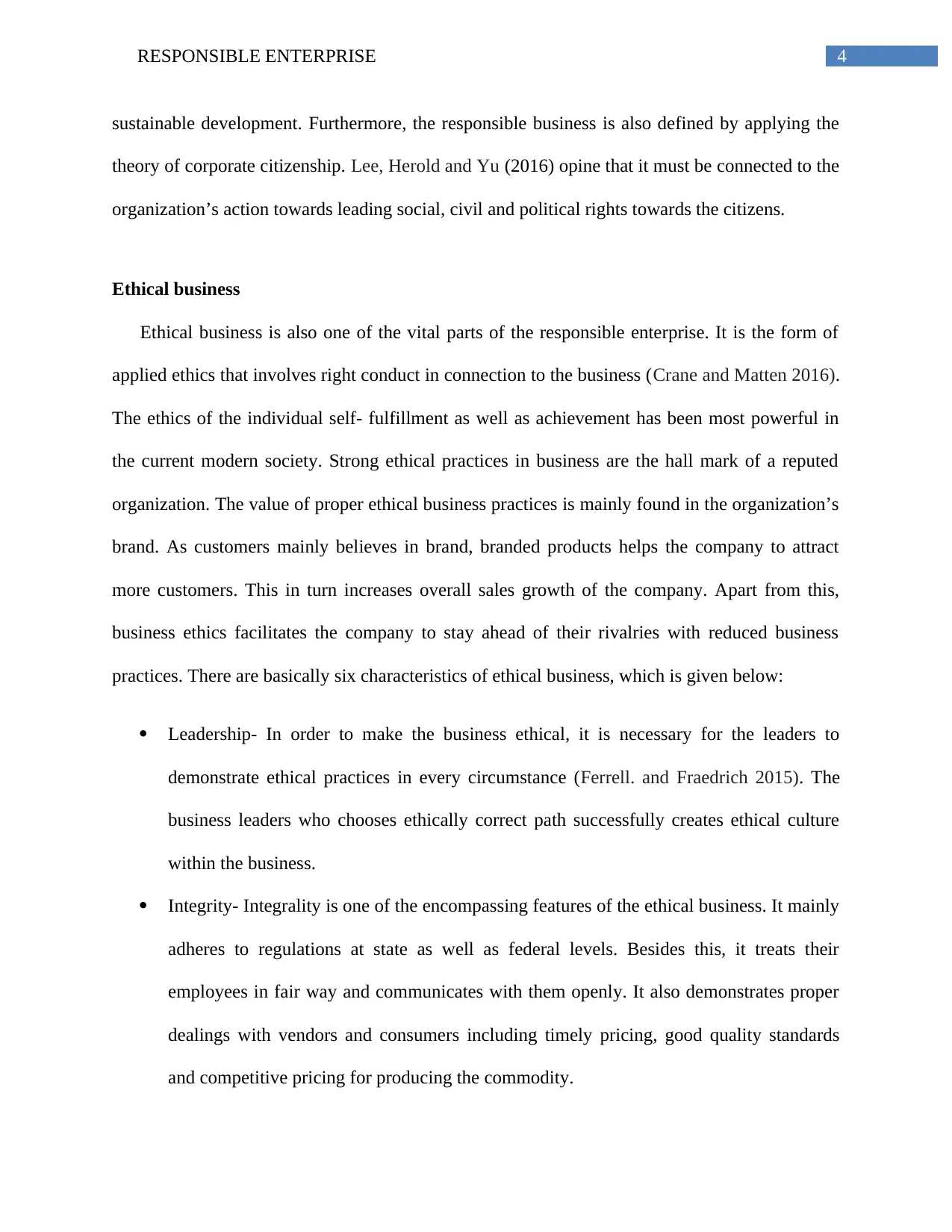
4RESPONSIBLE ENTERPRISE
sustainable development. Furthermore, the responsible business is also defined by applying the
theory of corporate citizenship. Lee, Herold and Yu (2016) opine that it must be connected to the
organization’s action towards leading social, civil and political rights towards the citizens.
Ethical business
Ethical business is also one of the vital parts of the responsible enterprise. It is the form of
applied ethics that involves right conduct in connection to the business (Crane and Matten 2016).
The ethics of the individual self- fulfillment as well as achievement has been most powerful in
the current modern society. Strong ethical practices in business are the hall mark of a reputed
organization. The value of proper ethical business practices is mainly found in the organization’s
brand. As customers mainly believes in brand, branded products helps the company to attract
more customers. This in turn increases overall sales growth of the company. Apart from this,
business ethics facilitates the company to stay ahead of their rivalries with reduced business
practices. There are basically six characteristics of ethical business, which is given below:
Leadership- In order to make the business ethical, it is necessary for the leaders to
demonstrate ethical practices in every circumstance (Ferrell. and Fraedrich 2015). The
business leaders who chooses ethically correct path successfully creates ethical culture
within the business.
Integrity- Integrality is one of the encompassing features of the ethical business. It mainly
adheres to regulations at state as well as federal levels. Besides this, it treats their
employees in fair way and communicates with them openly. It also demonstrates proper
dealings with vendors and consumers including timely pricing, good quality standards
and competitive pricing for producing the commodity.
sustainable development. Furthermore, the responsible business is also defined by applying the
theory of corporate citizenship. Lee, Herold and Yu (2016) opine that it must be connected to the
organization’s action towards leading social, civil and political rights towards the citizens.
Ethical business
Ethical business is also one of the vital parts of the responsible enterprise. It is the form of
applied ethics that involves right conduct in connection to the business (Crane and Matten 2016).
The ethics of the individual self- fulfillment as well as achievement has been most powerful in
the current modern society. Strong ethical practices in business are the hall mark of a reputed
organization. The value of proper ethical business practices is mainly found in the organization’s
brand. As customers mainly believes in brand, branded products helps the company to attract
more customers. This in turn increases overall sales growth of the company. Apart from this,
business ethics facilitates the company to stay ahead of their rivalries with reduced business
practices. There are basically six characteristics of ethical business, which is given below:
Leadership- In order to make the business ethical, it is necessary for the leaders to
demonstrate ethical practices in every circumstance (Ferrell. and Fraedrich 2015). The
business leaders who chooses ethically correct path successfully creates ethical culture
within the business.
Integrity- Integrality is one of the encompassing features of the ethical business. It mainly
adheres to regulations at state as well as federal levels. Besides this, it treats their
employees in fair way and communicates with them openly. It also demonstrates proper
dealings with vendors and consumers including timely pricing, good quality standards
and competitive pricing for producing the commodity.
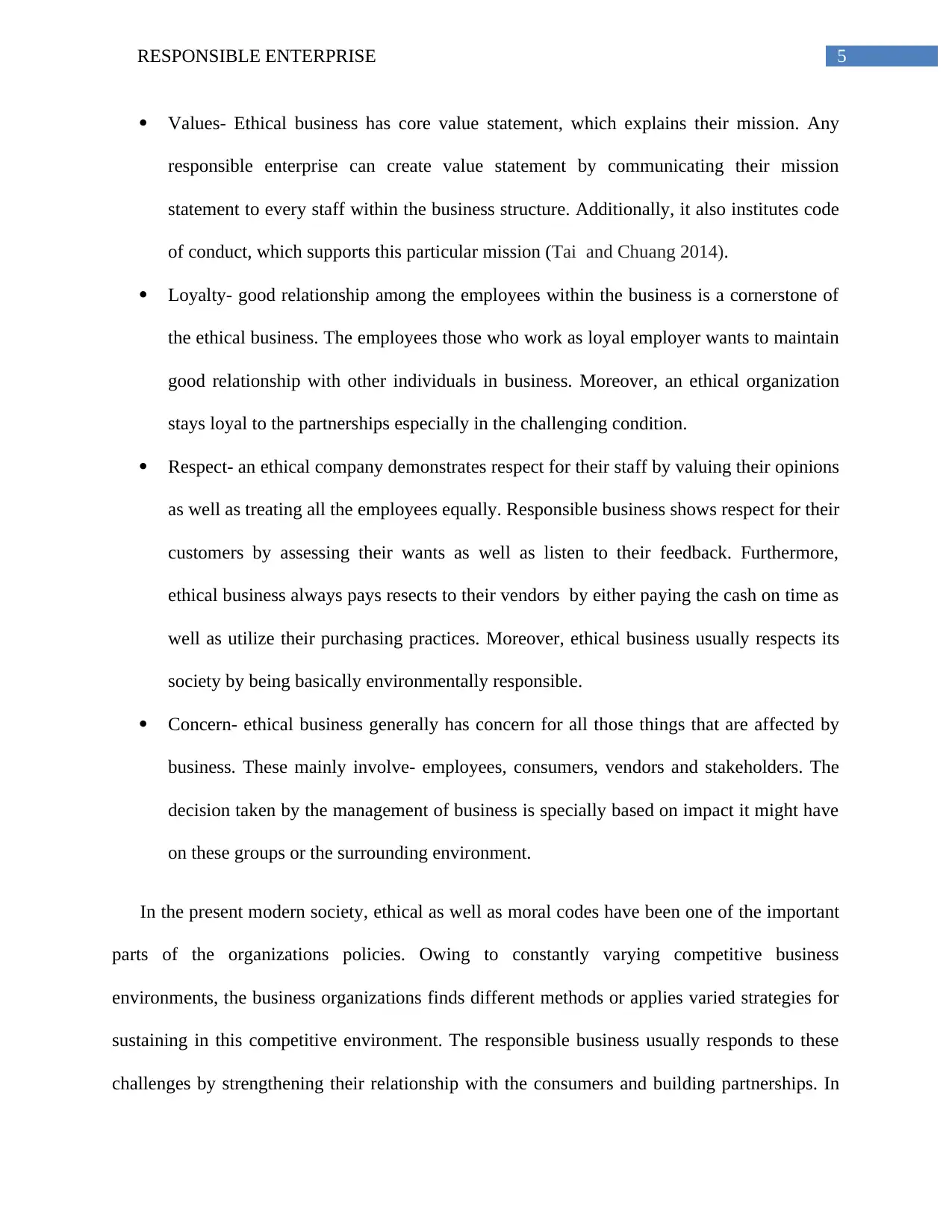
5RESPONSIBLE ENTERPRISE
Values- Ethical business has core value statement, which explains their mission. Any
responsible enterprise can create value statement by communicating their mission
statement to every staff within the business structure. Additionally, it also institutes code
of conduct, which supports this particular mission (Tai and Chuang 2014).
Loyalty- good relationship among the employees within the business is a cornerstone of
the ethical business. The employees those who work as loyal employer wants to maintain
good relationship with other individuals in business. Moreover, an ethical organization
stays loyal to the partnerships especially in the challenging condition.
Respect- an ethical company demonstrates respect for their staff by valuing their opinions
as well as treating all the employees equally. Responsible business shows respect for their
customers by assessing their wants as well as listen to their feedback. Furthermore,
ethical business always pays resects to their vendors by either paying the cash on time as
well as utilize their purchasing practices. Moreover, ethical business usually respects its
society by being basically environmentally responsible.
Concern- ethical business generally has concern for all those things that are affected by
business. These mainly involve- employees, consumers, vendors and stakeholders. The
decision taken by the management of business is specially based on impact it might have
on these groups or the surrounding environment.
In the present modern society, ethical as well as moral codes have been one of the important
parts of the organizations policies. Owing to constantly varying competitive business
environments, the business organizations finds different methods or applies varied strategies for
sustaining in this competitive environment. The responsible business usually responds to these
challenges by strengthening their relationship with the consumers and building partnerships. In
Values- Ethical business has core value statement, which explains their mission. Any
responsible enterprise can create value statement by communicating their mission
statement to every staff within the business structure. Additionally, it also institutes code
of conduct, which supports this particular mission (Tai and Chuang 2014).
Loyalty- good relationship among the employees within the business is a cornerstone of
the ethical business. The employees those who work as loyal employer wants to maintain
good relationship with other individuals in business. Moreover, an ethical organization
stays loyal to the partnerships especially in the challenging condition.
Respect- an ethical company demonstrates respect for their staff by valuing their opinions
as well as treating all the employees equally. Responsible business shows respect for their
customers by assessing their wants as well as listen to their feedback. Furthermore,
ethical business always pays resects to their vendors by either paying the cash on time as
well as utilize their purchasing practices. Moreover, ethical business usually respects its
society by being basically environmentally responsible.
Concern- ethical business generally has concern for all those things that are affected by
business. These mainly involve- employees, consumers, vendors and stakeholders. The
decision taken by the management of business is specially based on impact it might have
on these groups or the surrounding environment.
In the present modern society, ethical as well as moral codes have been one of the important
parts of the organizations policies. Owing to constantly varying competitive business
environments, the business organizations finds different methods or applies varied strategies for
sustaining in this competitive environment. The responsible business usually responds to these
challenges by strengthening their relationship with the consumers and building partnerships. In
⊘ This is a preview!⊘
Do you want full access?
Subscribe today to unlock all pages.

Trusted by 1+ million students worldwide
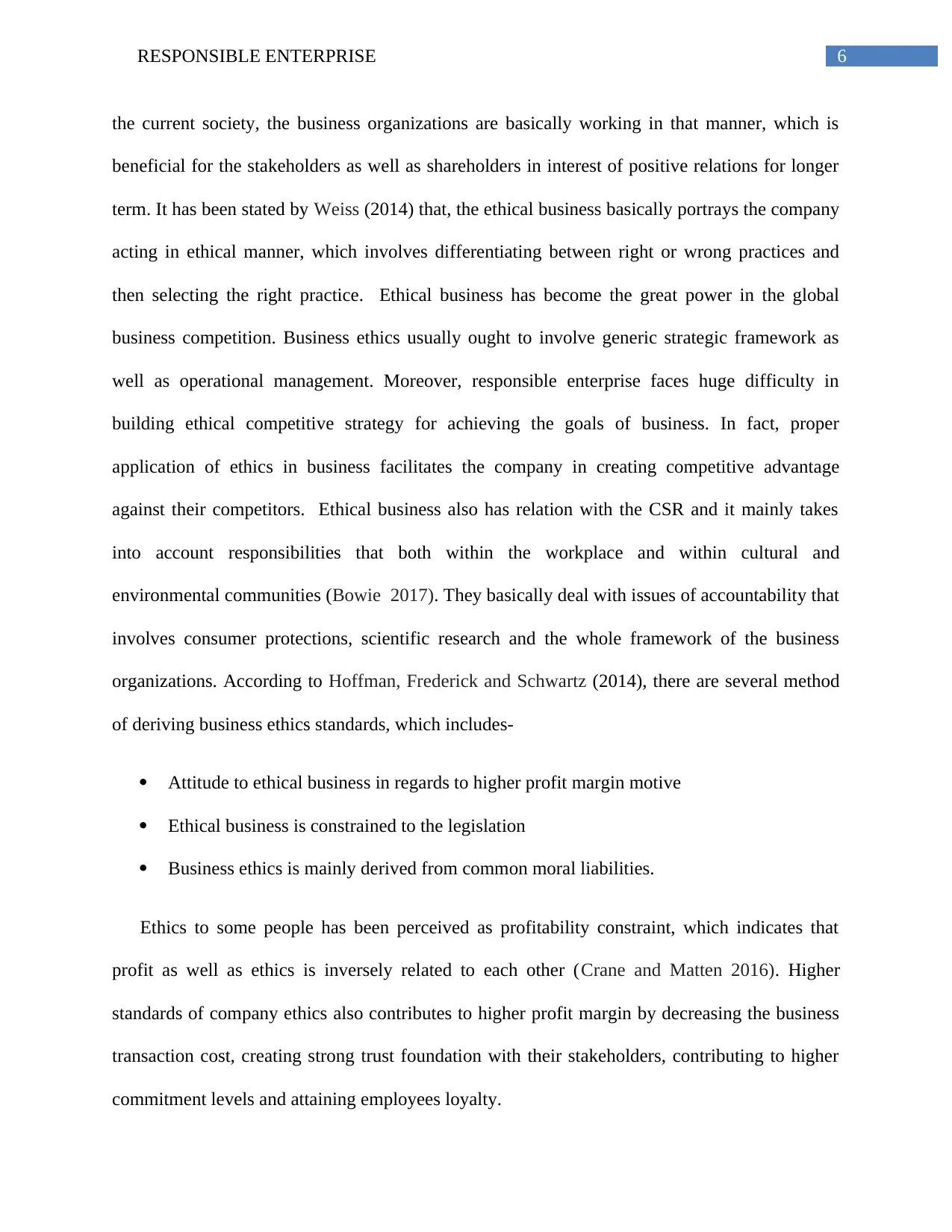
6RESPONSIBLE ENTERPRISE
the current society, the business organizations are basically working in that manner, which is
beneficial for the stakeholders as well as shareholders in interest of positive relations for longer
term. It has been stated by Weiss (2014) that, the ethical business basically portrays the company
acting in ethical manner, which involves differentiating between right or wrong practices and
then selecting the right practice. Ethical business has become the great power in the global
business competition. Business ethics usually ought to involve generic strategic framework as
well as operational management. Moreover, responsible enterprise faces huge difficulty in
building ethical competitive strategy for achieving the goals of business. In fact, proper
application of ethics in business facilitates the company in creating competitive advantage
against their competitors. Ethical business also has relation with the CSR and it mainly takes
into account responsibilities that both within the workplace and within cultural and
environmental communities (Bowie 2017). They basically deal with issues of accountability that
involves consumer protections, scientific research and the whole framework of the business
organizations. According to Hoffman, Frederick and Schwartz (2014), there are several method
of deriving business ethics standards, which includes-
Attitude to ethical business in regards to higher profit margin motive
Ethical business is constrained to the legislation
Business ethics is mainly derived from common moral liabilities.
Ethics to some people has been perceived as profitability constraint, which indicates that
profit as well as ethics is inversely related to each other (Crane and Matten 2016). Higher
standards of company ethics also contributes to higher profit margin by decreasing the business
transaction cost, creating strong trust foundation with their stakeholders, contributing to higher
commitment levels and attaining employees loyalty.
the current society, the business organizations are basically working in that manner, which is
beneficial for the stakeholders as well as shareholders in interest of positive relations for longer
term. It has been stated by Weiss (2014) that, the ethical business basically portrays the company
acting in ethical manner, which involves differentiating between right or wrong practices and
then selecting the right practice. Ethical business has become the great power in the global
business competition. Business ethics usually ought to involve generic strategic framework as
well as operational management. Moreover, responsible enterprise faces huge difficulty in
building ethical competitive strategy for achieving the goals of business. In fact, proper
application of ethics in business facilitates the company in creating competitive advantage
against their competitors. Ethical business also has relation with the CSR and it mainly takes
into account responsibilities that both within the workplace and within cultural and
environmental communities (Bowie 2017). They basically deal with issues of accountability that
involves consumer protections, scientific research and the whole framework of the business
organizations. According to Hoffman, Frederick and Schwartz (2014), there are several method
of deriving business ethics standards, which includes-
Attitude to ethical business in regards to higher profit margin motive
Ethical business is constrained to the legislation
Business ethics is mainly derived from common moral liabilities.
Ethics to some people has been perceived as profitability constraint, which indicates that
profit as well as ethics is inversely related to each other (Crane and Matten 2016). Higher
standards of company ethics also contributes to higher profit margin by decreasing the business
transaction cost, creating strong trust foundation with their stakeholders, contributing to higher
commitment levels and attaining employees loyalty.
Paraphrase This Document
Need a fresh take? Get an instant paraphrase of this document with our AI Paraphraser
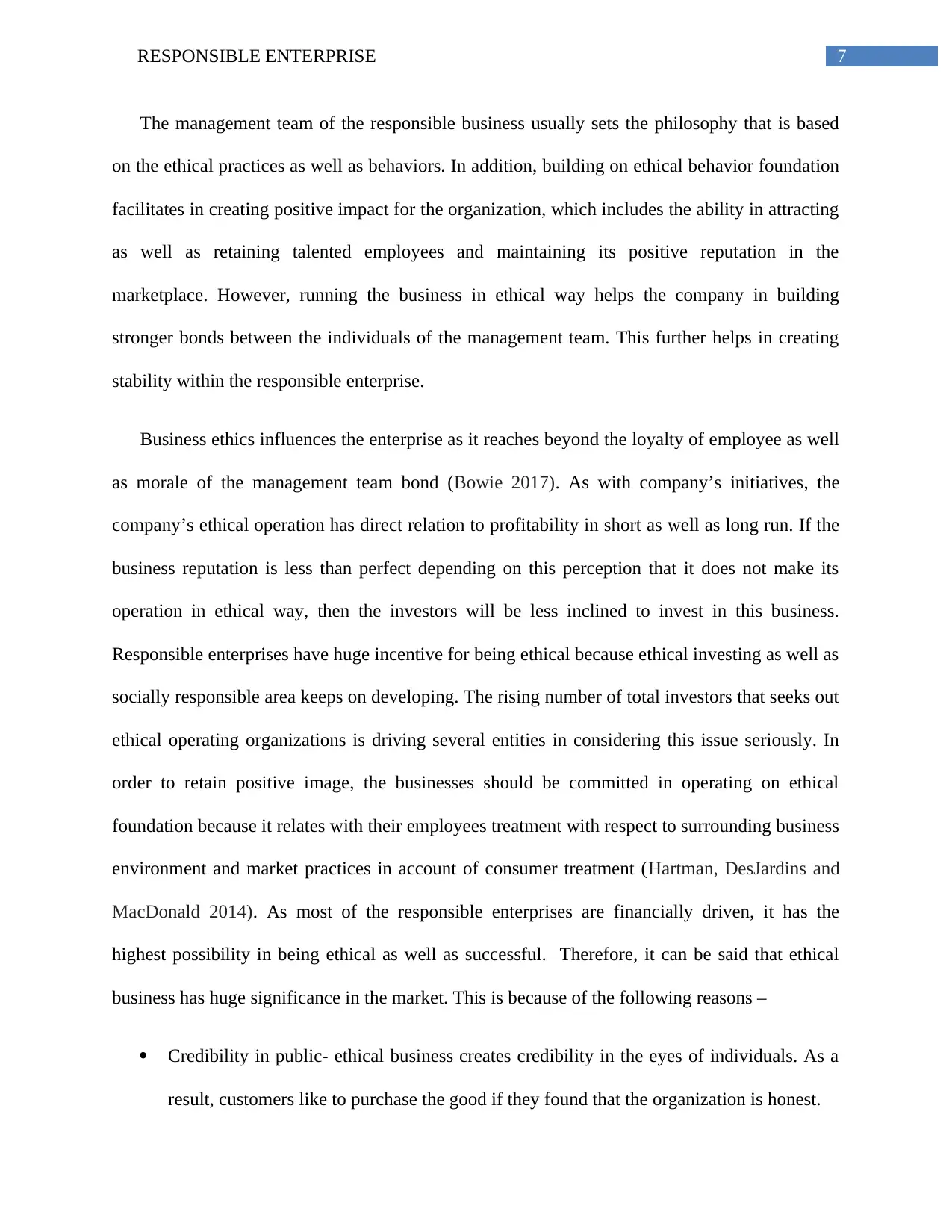
7RESPONSIBLE ENTERPRISE
The management team of the responsible business usually sets the philosophy that is based
on the ethical practices as well as behaviors. In addition, building on ethical behavior foundation
facilitates in creating positive impact for the organization, which includes the ability in attracting
as well as retaining talented employees and maintaining its positive reputation in the
marketplace. However, running the business in ethical way helps the company in building
stronger bonds between the individuals of the management team. This further helps in creating
stability within the responsible enterprise.
Business ethics influences the enterprise as it reaches beyond the loyalty of employee as well
as morale of the management team bond (Bowie 2017). As with company’s initiatives, the
company’s ethical operation has direct relation to profitability in short as well as long run. If the
business reputation is less than perfect depending on this perception that it does not make its
operation in ethical way, then the investors will be less inclined to invest in this business.
Responsible enterprises have huge incentive for being ethical because ethical investing as well as
socially responsible area keeps on developing. The rising number of total investors that seeks out
ethical operating organizations is driving several entities in considering this issue seriously. In
order to retain positive image, the businesses should be committed in operating on ethical
foundation because it relates with their employees treatment with respect to surrounding business
environment and market practices in account of consumer treatment (Hartman, DesJardins and
MacDonald 2014). As most of the responsible enterprises are financially driven, it has the
highest possibility in being ethical as well as successful. Therefore, it can be said that ethical
business has huge significance in the market. This is because of the following reasons –
Credibility in public- ethical business creates credibility in the eyes of individuals. As a
result, customers like to purchase the good if they found that the organization is honest.
The management team of the responsible business usually sets the philosophy that is based
on the ethical practices as well as behaviors. In addition, building on ethical behavior foundation
facilitates in creating positive impact for the organization, which includes the ability in attracting
as well as retaining talented employees and maintaining its positive reputation in the
marketplace. However, running the business in ethical way helps the company in building
stronger bonds between the individuals of the management team. This further helps in creating
stability within the responsible enterprise.
Business ethics influences the enterprise as it reaches beyond the loyalty of employee as well
as morale of the management team bond (Bowie 2017). As with company’s initiatives, the
company’s ethical operation has direct relation to profitability in short as well as long run. If the
business reputation is less than perfect depending on this perception that it does not make its
operation in ethical way, then the investors will be less inclined to invest in this business.
Responsible enterprises have huge incentive for being ethical because ethical investing as well as
socially responsible area keeps on developing. The rising number of total investors that seeks out
ethical operating organizations is driving several entities in considering this issue seriously. In
order to retain positive image, the businesses should be committed in operating on ethical
foundation because it relates with their employees treatment with respect to surrounding business
environment and market practices in account of consumer treatment (Hartman, DesJardins and
MacDonald 2014). As most of the responsible enterprises are financially driven, it has the
highest possibility in being ethical as well as successful. Therefore, it can be said that ethical
business has huge significance in the market. This is because of the following reasons –
Credibility in public- ethical business creates credibility in the eyes of individuals. As a
result, customers like to purchase the good if they found that the organization is honest.
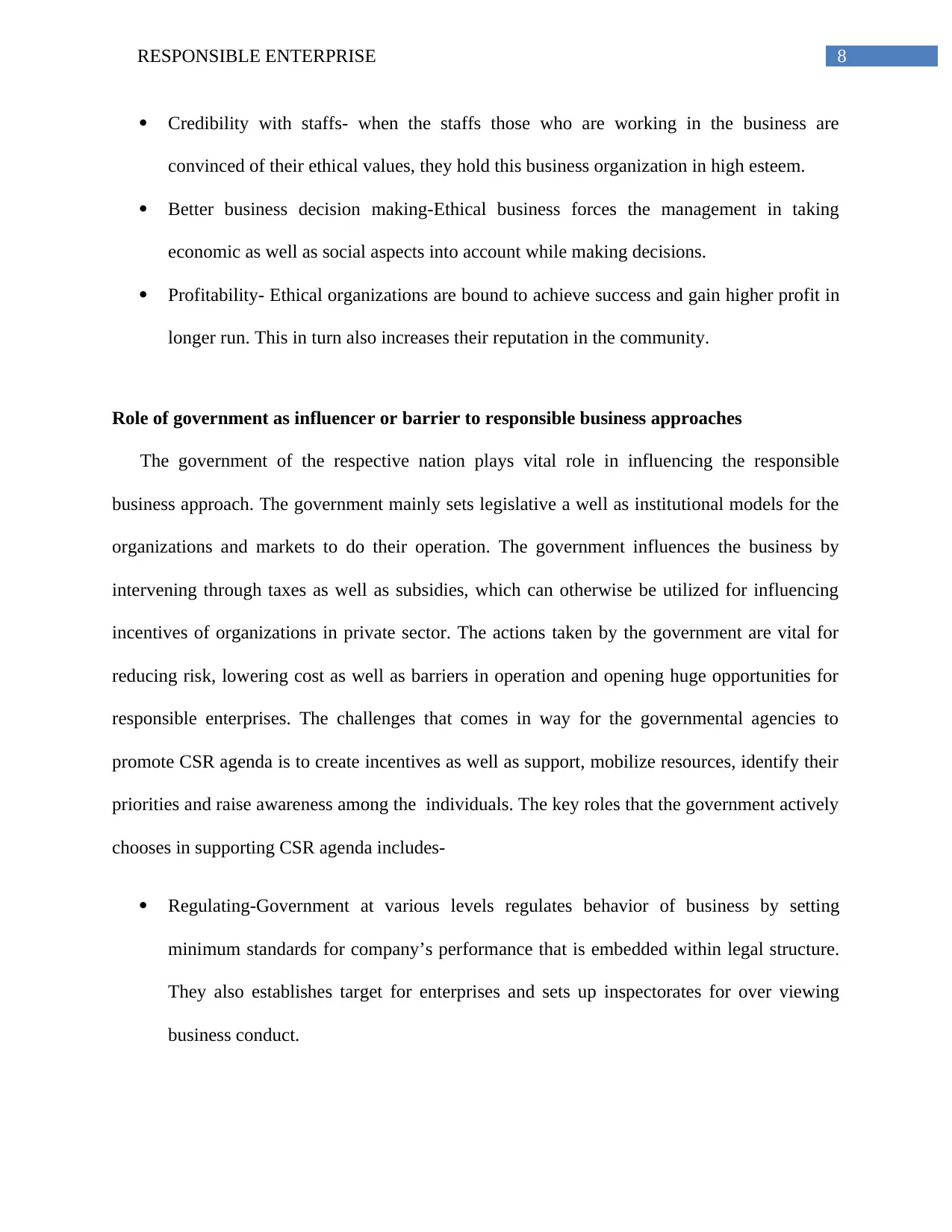
8RESPONSIBLE ENTERPRISE
Credibility with staffs- when the staffs those who are working in the business are
convinced of their ethical values, they hold this business organization in high esteem.
Better business decision making-Ethical business forces the management in taking
economic as well as social aspects into account while making decisions.
Profitability- Ethical organizations are bound to achieve success and gain higher profit in
longer run. This in turn also increases their reputation in the community.
Role of government as influencer or barrier to responsible business approaches
The government of the respective nation plays vital role in influencing the responsible
business approach. The government mainly sets legislative a well as institutional models for the
organizations and markets to do their operation. The government influences the business by
intervening through taxes as well as subsidies, which can otherwise be utilized for influencing
incentives of organizations in private sector. The actions taken by the government are vital for
reducing risk, lowering cost as well as barriers in operation and opening huge opportunities for
responsible enterprises. The challenges that comes in way for the governmental agencies to
promote CSR agenda is to create incentives as well as support, mobilize resources, identify their
priorities and raise awareness among the individuals. The key roles that the government actively
chooses in supporting CSR agenda includes-
Regulating-Government at various levels regulates behavior of business by setting
minimum standards for company’s performance that is embedded within legal structure.
They also establishes target for enterprises and sets up inspectorates for over viewing
business conduct.
Credibility with staffs- when the staffs those who are working in the business are
convinced of their ethical values, they hold this business organization in high esteem.
Better business decision making-Ethical business forces the management in taking
economic as well as social aspects into account while making decisions.
Profitability- Ethical organizations are bound to achieve success and gain higher profit in
longer run. This in turn also increases their reputation in the community.
Role of government as influencer or barrier to responsible business approaches
The government of the respective nation plays vital role in influencing the responsible
business approach. The government mainly sets legislative a well as institutional models for the
organizations and markets to do their operation. The government influences the business by
intervening through taxes as well as subsidies, which can otherwise be utilized for influencing
incentives of organizations in private sector. The actions taken by the government are vital for
reducing risk, lowering cost as well as barriers in operation and opening huge opportunities for
responsible enterprises. The challenges that comes in way for the governmental agencies to
promote CSR agenda is to create incentives as well as support, mobilize resources, identify their
priorities and raise awareness among the individuals. The key roles that the government actively
chooses in supporting CSR agenda includes-
Regulating-Government at various levels regulates behavior of business by setting
minimum standards for company’s performance that is embedded within legal structure.
They also establishes target for enterprises and sets up inspectorates for over viewing
business conduct.
⊘ This is a preview!⊘
Do you want full access?
Subscribe today to unlock all pages.

Trusted by 1+ million students worldwide
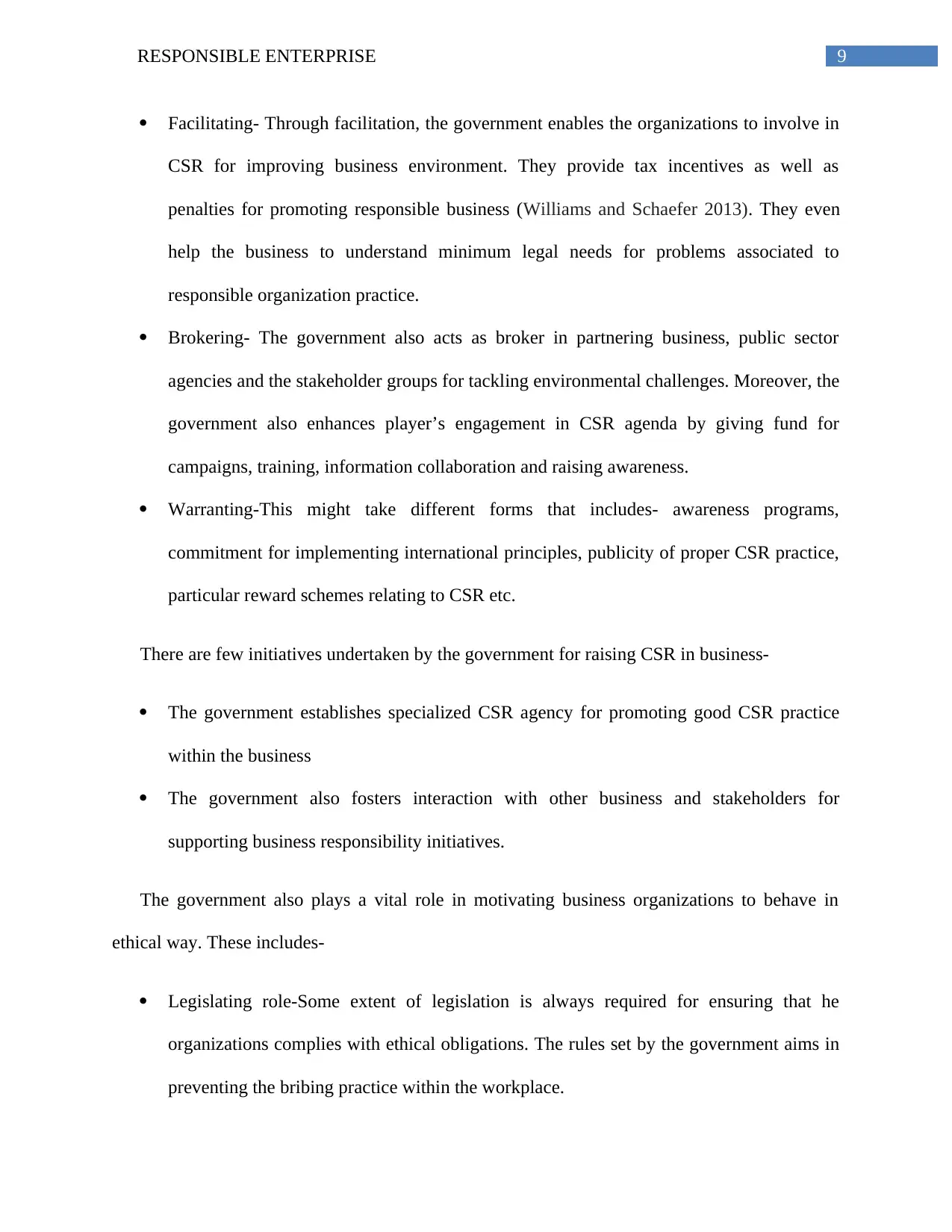
9RESPONSIBLE ENTERPRISE
Facilitating- Through facilitation, the government enables the organizations to involve in
CSR for improving business environment. They provide tax incentives as well as
penalties for promoting responsible business (Williams and Schaefer 2013). They even
help the business to understand minimum legal needs for problems associated to
responsible organization practice.
Brokering- The government also acts as broker in partnering business, public sector
agencies and the stakeholder groups for tackling environmental challenges. Moreover, the
government also enhances player’s engagement in CSR agenda by giving fund for
campaigns, training, information collaboration and raising awareness.
Warranting-This might take different forms that includes- awareness programs,
commitment for implementing international principles, publicity of proper CSR practice,
particular reward schemes relating to CSR etc.
There are few initiatives undertaken by the government for raising CSR in business-
The government establishes specialized CSR agency for promoting good CSR practice
within the business
The government also fosters interaction with other business and stakeholders for
supporting business responsibility initiatives.
The government also plays a vital role in motivating business organizations to behave in
ethical way. These includes-
Legislating role-Some extent of legislation is always required for ensuring that he
organizations complies with ethical obligations. The rules set by the government aims in
preventing the bribing practice within the workplace.
Facilitating- Through facilitation, the government enables the organizations to involve in
CSR for improving business environment. They provide tax incentives as well as
penalties for promoting responsible business (Williams and Schaefer 2013). They even
help the business to understand minimum legal needs for problems associated to
responsible organization practice.
Brokering- The government also acts as broker in partnering business, public sector
agencies and the stakeholder groups for tackling environmental challenges. Moreover, the
government also enhances player’s engagement in CSR agenda by giving fund for
campaigns, training, information collaboration and raising awareness.
Warranting-This might take different forms that includes- awareness programs,
commitment for implementing international principles, publicity of proper CSR practice,
particular reward schemes relating to CSR etc.
There are few initiatives undertaken by the government for raising CSR in business-
The government establishes specialized CSR agency for promoting good CSR practice
within the business
The government also fosters interaction with other business and stakeholders for
supporting business responsibility initiatives.
The government also plays a vital role in motivating business organizations to behave in
ethical way. These includes-
Legislating role-Some extent of legislation is always required for ensuring that he
organizations complies with ethical obligations. The rules set by the government aims in
preventing the bribing practice within the workplace.
Paraphrase This Document
Need a fresh take? Get an instant paraphrase of this document with our AI Paraphraser
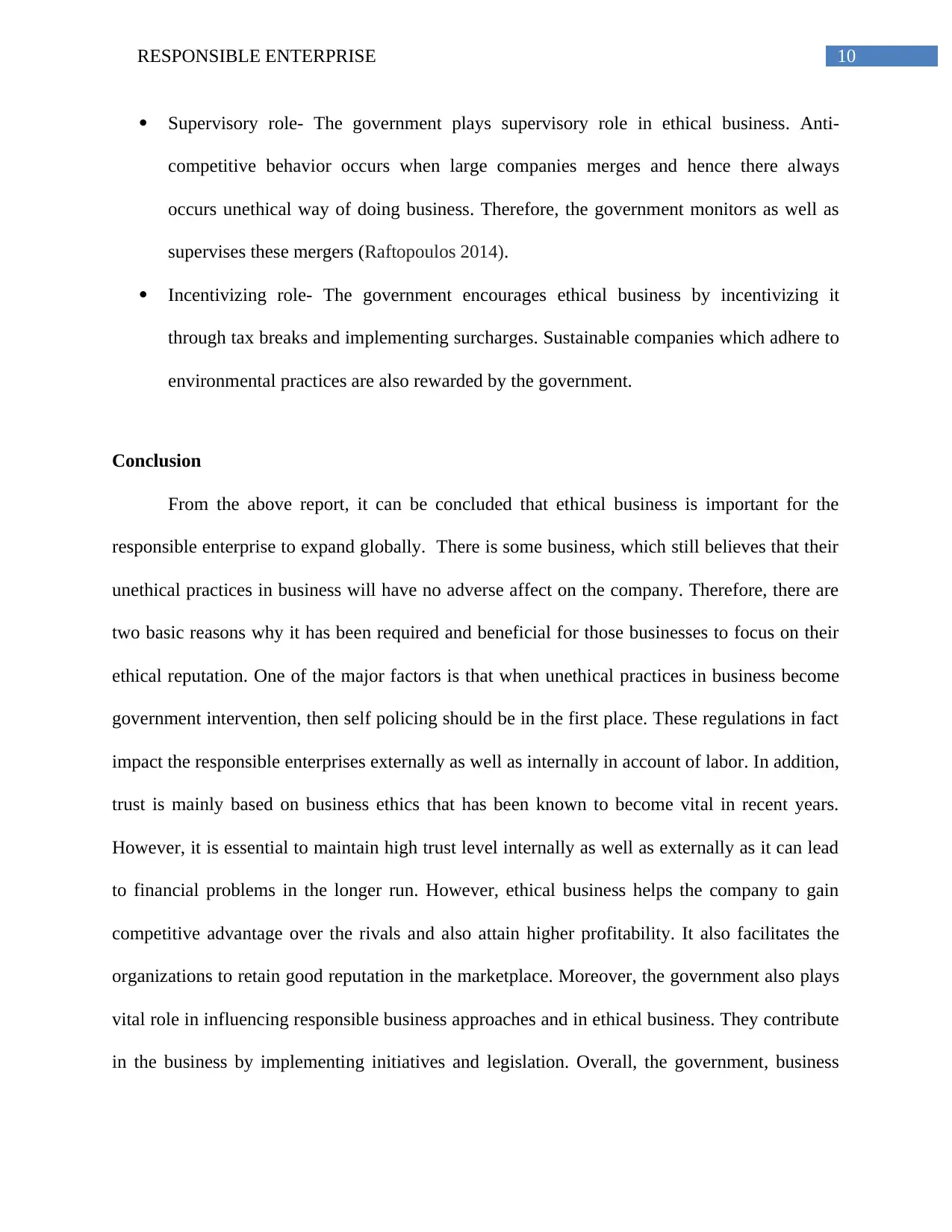
10RESPONSIBLE ENTERPRISE
Supervisory role- The government plays supervisory role in ethical business. Anti-
competitive behavior occurs when large companies merges and hence there always
occurs unethical way of doing business. Therefore, the government monitors as well as
supervises these mergers (Raftopoulos 2014).
Incentivizing role- The government encourages ethical business by incentivizing it
through tax breaks and implementing surcharges. Sustainable companies which adhere to
environmental practices are also rewarded by the government.
Conclusion
From the above report, it can be concluded that ethical business is important for the
responsible enterprise to expand globally. There is some business, which still believes that their
unethical practices in business will have no adverse affect on the company. Therefore, there are
two basic reasons why it has been required and beneficial for those businesses to focus on their
ethical reputation. One of the major factors is that when unethical practices in business become
government intervention, then self policing should be in the first place. These regulations in fact
impact the responsible enterprises externally as well as internally in account of labor. In addition,
trust is mainly based on business ethics that has been known to become vital in recent years.
However, it is essential to maintain high trust level internally as well as externally as it can lead
to financial problems in the longer run. However, ethical business helps the company to gain
competitive advantage over the rivals and also attain higher profitability. It also facilitates the
organizations to retain good reputation in the marketplace. Moreover, the government also plays
vital role in influencing responsible business approaches and in ethical business. They contribute
in the business by implementing initiatives and legislation. Overall, the government, business
Supervisory role- The government plays supervisory role in ethical business. Anti-
competitive behavior occurs when large companies merges and hence there always
occurs unethical way of doing business. Therefore, the government monitors as well as
supervises these mergers (Raftopoulos 2014).
Incentivizing role- The government encourages ethical business by incentivizing it
through tax breaks and implementing surcharges. Sustainable companies which adhere to
environmental practices are also rewarded by the government.
Conclusion
From the above report, it can be concluded that ethical business is important for the
responsible enterprise to expand globally. There is some business, which still believes that their
unethical practices in business will have no adverse affect on the company. Therefore, there are
two basic reasons why it has been required and beneficial for those businesses to focus on their
ethical reputation. One of the major factors is that when unethical practices in business become
government intervention, then self policing should be in the first place. These regulations in fact
impact the responsible enterprises externally as well as internally in account of labor. In addition,
trust is mainly based on business ethics that has been known to become vital in recent years.
However, it is essential to maintain high trust level internally as well as externally as it can lead
to financial problems in the longer run. However, ethical business helps the company to gain
competitive advantage over the rivals and also attain higher profitability. It also facilitates the
organizations to retain good reputation in the marketplace. Moreover, the government also plays
vital role in influencing responsible business approaches and in ethical business. They contribute
in the business by implementing initiatives and legislation. Overall, the government, business
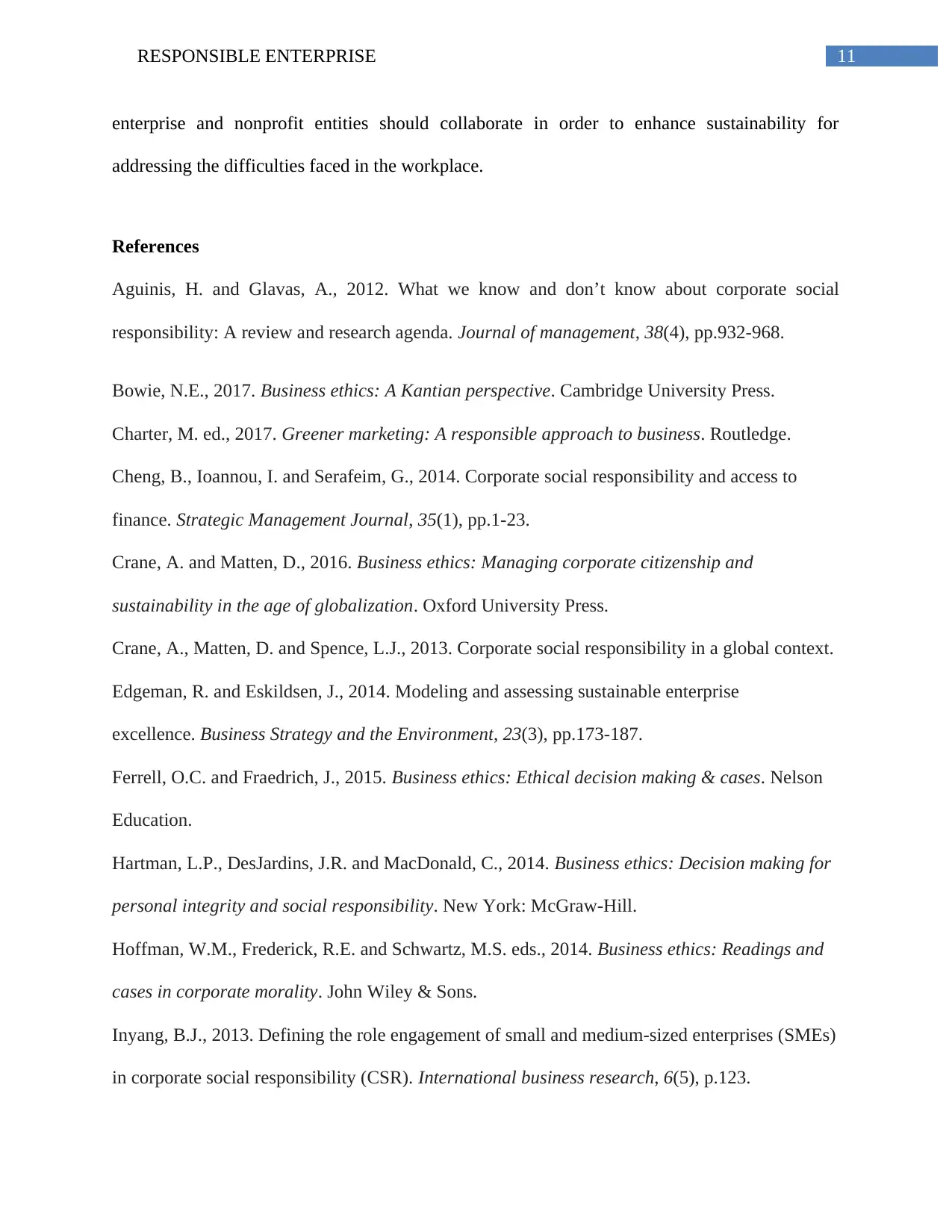
11RESPONSIBLE ENTERPRISE
enterprise and nonprofit entities should collaborate in order to enhance sustainability for
addressing the difficulties faced in the workplace.
References
Aguinis, H. and Glavas, A., 2012. What we know and don’t know about corporate social
responsibility: A review and research agenda. Journal of management, 38(4), pp.932-968.
Bowie, N.E., 2017. Business ethics: A Kantian perspective. Cambridge University Press.
Charter, M. ed., 2017. Greener marketing: A responsible approach to business. Routledge.
Cheng, B., Ioannou, I. and Serafeim, G., 2014. Corporate social responsibility and access to
finance. Strategic Management Journal, 35(1), pp.1-23.
Crane, A. and Matten, D., 2016. Business ethics: Managing corporate citizenship and
sustainability in the age of globalization. Oxford University Press.
Crane, A., Matten, D. and Spence, L.J., 2013. Corporate social responsibility in a global context.
Edgeman, R. and Eskildsen, J., 2014. Modeling and assessing sustainable enterprise
excellence. Business Strategy and the Environment, 23(3), pp.173-187.
Ferrell, O.C. and Fraedrich, J., 2015. Business ethics: Ethical decision making & cases. Nelson
Education.
Hartman, L.P., DesJardins, J.R. and MacDonald, C., 2014. Business ethics: Decision making for
personal integrity and social responsibility. New York: McGraw-Hill.
Hoffman, W.M., Frederick, R.E. and Schwartz, M.S. eds., 2014. Business ethics: Readings and
cases in corporate morality. John Wiley & Sons.
Inyang, B.J., 2013. Defining the role engagement of small and medium-sized enterprises (SMEs)
in corporate social responsibility (CSR). International business research, 6(5), p.123.
enterprise and nonprofit entities should collaborate in order to enhance sustainability for
addressing the difficulties faced in the workplace.
References
Aguinis, H. and Glavas, A., 2012. What we know and don’t know about corporate social
responsibility: A review and research agenda. Journal of management, 38(4), pp.932-968.
Bowie, N.E., 2017. Business ethics: A Kantian perspective. Cambridge University Press.
Charter, M. ed., 2017. Greener marketing: A responsible approach to business. Routledge.
Cheng, B., Ioannou, I. and Serafeim, G., 2014. Corporate social responsibility and access to
finance. Strategic Management Journal, 35(1), pp.1-23.
Crane, A. and Matten, D., 2016. Business ethics: Managing corporate citizenship and
sustainability in the age of globalization. Oxford University Press.
Crane, A., Matten, D. and Spence, L.J., 2013. Corporate social responsibility in a global context.
Edgeman, R. and Eskildsen, J., 2014. Modeling and assessing sustainable enterprise
excellence. Business Strategy and the Environment, 23(3), pp.173-187.
Ferrell, O.C. and Fraedrich, J., 2015. Business ethics: Ethical decision making & cases. Nelson
Education.
Hartman, L.P., DesJardins, J.R. and MacDonald, C., 2014. Business ethics: Decision making for
personal integrity and social responsibility. New York: McGraw-Hill.
Hoffman, W.M., Frederick, R.E. and Schwartz, M.S. eds., 2014. Business ethics: Readings and
cases in corporate morality. John Wiley & Sons.
Inyang, B.J., 2013. Defining the role engagement of small and medium-sized enterprises (SMEs)
in corporate social responsibility (CSR). International business research, 6(5), p.123.
⊘ This is a preview!⊘
Do you want full access?
Subscribe today to unlock all pages.

Trusted by 1+ million students worldwide
1 out of 14
Related Documents
Your All-in-One AI-Powered Toolkit for Academic Success.
+13062052269
info@desklib.com
Available 24*7 on WhatsApp / Email
![[object Object]](/_next/static/media/star-bottom.7253800d.svg)
Unlock your academic potential
Copyright © 2020–2026 A2Z Services. All Rights Reserved. Developed and managed by ZUCOL.





